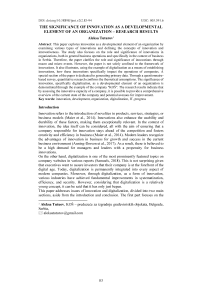The significance of innovation as a developmental element of an organization – research results
Автор: Aleksa Tuturov
Журнал: International Journal of Management Trends: Key Concepts and Research @journal-ijmt
Статья в выпуске: 2 vol.2, 2023 года.
Бесплатный доступ
This paper explores innovation as a developmental element of an organization by examining various types of innovations and defining the concepts of innovation and innovativeness. The study also focuses on the role and significance of innovations in organizations, both in general business operations and specifically in the context of business in Serbia. Therefore, the paper clarifies the role and significance of innovations through macro and micro events. However, the paper is not solely confined to the framework of innovations. It also illustrates, using the example of digitalization as a means of establishing innovations, how these innovations specifically impact the operations of companies. A special section of the paper is dedicated to generating primary data. Through a questionnairebased survey, quantitative research confirms the theoretical assumptions. The significance of innovation, specifically digitalization, as a developmental element of an organization is demonstrated through the example of the company "KOŠ". The research results indicate that by assessing the innovative capacity of a company, it is possible to provide a comprehensive overview of the current state of the company and potential avenues for improvement.
Innovation, development, organization, digitalization, IT, progress
Короткий адрес: https://sciup.org/170203996
IDR: 170203996 | УДК: 005.591.6 | DOI: 10.58898/ijmt.v2i2.83-94
Текст научной статьи The significance of innovation as a developmental element of an organization – research results
Innovation refers to the introduction of novelties in products, services, strategies, or business models (Maier et al., 2014). Innovations also enhance the usability and durability of these factors, making them exceptionally relevant. In the context of innovation, the idea itself can be considered, all with the aim of ensuring that a company responsible for innovation stays ahead of the competition and fosters creativity and efficiency in business (Maier et al., 2014). Modern leaders recognize the advantages of innovation in business for growth and success in the current business environment (Anning-Dorson et al., 2017). As a result, there is believed to be a high demand for managers and leaders with a propensity for business innovations.
On the other hand, digitalization is one of the most prominently featured topics on company websites in various reports (Samuels, 2018). This is not surprising given that executives want to assure investors that their company is at the forefront of the digital age. Today, digitalization is permanently integrated into every aspect of modern companies. Moreover, through digitalization, as a form of innovation, various industries have achieved fundamental improvements in systematization, efficiency, and security. However, considering that digitalization is a relatively young concept, it can be said that it has only just begun.
This paper addresses issues of innovation and digitalization, divided into two main sections, aside from the introduction and conclusion. The first part focuses on the theoretical aspect, dedicated to defining the concepts of innovation and innovativeness, and explores the role and significance of innovations in organizations. Special sub-segments concentrate on the economy of Serbia and organizational development, examining the significance of innovations from macro and micro perspectives. In the theoretical part, the paper also delves into the role and significance of innovations using the example of digitalization as a developmental element of an organization, with attention given to developmental changes. In this context, workplace location changes, generational shifts in the workforce, mobility changes, increased employee connectivity, as well as changes resulting from IT consumerization and alterations in security procedures, are individually elucidated. Finally, in the practical part of the paper, research is conducted based on a quantitative survey technique. The research methodology is described first, followed by a case study detailing the results. In the concluding considerations, attention is given to research limitations and suggestions for future studies.
Concept of Innovation
Innovation, by definition, is the introduction of something new. Without innovation, there is nothing new, and without anything new, progress will not occur. On the other hand, innovativeness, as a concept, has emerged from the noun "innovation" (innovare, Latin), which implies change, novelty, or the process of making changes. If an organization does not progress, it simply cannot remain relevant in a competitive market. Since organizations often interact with other individual entities, understanding the impact of innovations on our society as a whole can sometimes be challenging. However, innovations are much more than just tools for companies seeking a competitive advantage. Innovation is indeed the fundamental reason for modern existence. Although innovation may have some unintended consequences, change is inevitable, and in most cases, innovation brings about positive changes (Xu et al., 2007).
Efficiency, novelty, and automation are some of the main characteristics of innovation. These unique features contribute to various advantages for businesses, reflecting the significance of innovation. To effectively address complex business challenges, it is necessary to leverage innovative ideas. Leaders must use external sources (online data, literature, etc.) and internal resources to develop innovative ideas for solving intricate business problems (Anning-Dorson et al., 2017).
Anning-Dorson et al. (2017) state that one of the advantages of innovation in business is the increased productivity of individuals, processes, and business models. Innovation provides new ideas to business leaders to enhance efficiency with minimal resources (Anning-Dorson et al., 2017). Furthermore, it reduces business and other risks.
Business processes have remained largely unchanged for several decades. However, with the introduction of innovation in business, disruptions have occurred, believed to be caused by novelty, creativity, and uniqueness. This also helps distinguish the business from others, contributing to increased revenue and market share. Innovative or creative thinking can assist managers and leaders in developing unique marketing campaigns that will help them stand out. However, one of the greatest benefits of innovation is its contribution to revenue and market share growth. Consequently, this leads to cost reduction.
The Role and Significance of Innovation in the Economy of the Republic of Serbia
In recent decades, innovation has become a significant means to combat critical social risks and threats. As such, innovations play a role at the macro level, and their significance can be observed within the framework of a state. In the context of Serbia, society is engaged in continuous economic growth, which largely depends on the growth of innovation (Čabilovski and Vukša, 2019).
Innovations are crucial for the progress of society as they address various types of social issues and enhance the society's ability to act. They are responsible for solving collective problems in a sustainable and efficient manner, usually with the help of new technology. These new technologies, products, and services simultaneously meet social needs and lead to improved capabilities and better use of resources. To address such social problems, private, public, and non-profit sectors are involved (Strugar, 2015). In this case, Serbia is no exception.
In the case of the Serbian economy, the outcome of innovation should always result in improvement. From the societal perspective, the fundamental outcomes of innovations are economic growth, increased prosperity and communication, accessibility of education, and environmental sustainability (Čabilovski and Vukša, 2019).
In general, it is challenging to identify industries where innovations would not be important. While certain industries depend on innovations more than others, innovation and the ability to improve are considerations for all. Innovation can bring significant benefits and is one of the key skills for achieving success in any business. Essentially, according to research results, innovations impact: competitive advantage, increased productivity, and have a positive influence on the company's culture (Čabilovski and Vukša, 2019).
Research Framework
The research framework encompasses the research concept, subject, aim, and research task, outlining how the study was conducted. This section discusses data collection, identifies research participants, and includes a segment dedicated to research results.
Given the role and significance of the research subject in the process, it logically represents a crucial part of any scientific investigation. In determining the research subject, it can be said that it is established by the title related to the importance of innovation as a developmental element of the organization. The research subject also involves examining the innovation capacity of the products and processes of the selected organization.
Research objectives are always conditioned by the formulation of the research subject and can be observed from both scientific and social perspectives. Considering the theory, scientific research objectives can be seen through scientific classification, description, discovery, explanation, and prediction. Specifically, in this work, the scientific objective is linked to scientific description. Through this, it is essential to present and define the concept of innovation and showcase it within the framework of the organizational development element.
It is crucial to note that there is a significant number of different articles, books, and other publications on this topic. Such publications have been analyzed in the thesis to determine and summarize the main findings, reach new conclusions, and discover new specificities. Therefore, it is necessary to mention that the research goal is also to provide a better understanding of the subject, primarily for individuals working in a dynamic environment characteristic of innovations.
Additionally, it is relevant to note that the research goals in the paper can be observed on two more levels: goals related to the theoretical part of the work and goals related to the empirical part of the work. Objectives related to the theoretical segment involve analyzing the content of contemporary literature in the field of development management and defining the basic activities of innovations in organizations. On the other hand, objectives related to the empirical part of the work focus on determining the activities of product innovation, identifying the activities of process innovation, and determining the shortcomings of the examined functions.
In research, a mono-method approach can be employed, applying this methodology when a specific method, such as surveys alone, is used for information collection. Alternatively, the multiple methods option can be utilized (Saunders et al., 2008). Multiple methods can be categorized into two groups. The first category involves a mixed-method approach, while the second is based on a mixed method. If a researcher chooses different methods to gather information, they are using a mixed method. On the other hand, multiple methods are further divided into qualitative and quantitative studies, which are primarily used separately but can also be combined (Saunders et al., 2008). A quantitative multi-method design may use secondary data, different surveys, and various observations, while a qualitative multi-method design can be based on interviews and personal observations.
This research adopts a mono-method based on a survey, representing a quantitative approach.
Table 1: Choice of Research Methodology ( Saunders et al., 2008) Choice of Research Methodology
Mono-method
Višestruka metoda
Approach with Multiple Methods
Mixed Method
Multiple
Multiple
Quantitative Quantitative
Studies
Studies
Combination of Different Methods
Combination of Different Models
On the other hand, data can be primary or secondary. Primary data are those that have not been published before and are collected through primary research (Saunders et al., 2008). In contrast, secondary data already exist and are part of literature, documents, various laws, and the like (Saunders et al., 2008). This research will yield primary data, and secondary data will also be used. The sources of secondary data to be utilized include books, journals, and documents with the potential to be useful in processing the topic. On the other hand, the source of primary data is a questionnaire. The data obtained in this way are processed statistically.
For the purposes of the research, a portion of a standardized questionnaire relying on the Oslo Manual (OECD, 2005) was used, providing a detailed guide for collecting, processing, and analyzing data related to the innovation process (e.g., innovation activities, expenditures for innovation activities, as well as the connection of companies with other actors in the national innovation system), the implementation of significant improvements in products and processes within the company (different types of innovations), and obtaining information on factors influencing the performance of innovation activities and their effects. The handbook defines questions related to the examination of innovations in products and processes, innovation activities, and tasks for innovation activities, the most significant sources of information for innovations, the most significant effects of innovation, and obstacles to innovation activities.
The research instrument relates to questions regarding product and process innovation within the organization:
-
• Independent variables defined by questions 1 to 4
-
• Dependent variables defined by questions 5 to 9, which focused on examining the innovativeness of products, and
-
• Questions 9 to 11, which focused on examining the innovativeness of processes. Closed-ended questions were used in the questionnaire, where respondents express their opinions by selecting one of the provided alternatives. When analyzing data, both primary and secondary, the main purpose is to organize and extract meaning from the collected data and draw realistic conclusions (Bengtsson, 2016). The statistical method is unique because its application primarily lies in a quantitative approach. It is used to investigate phenomena by collecting and processing data, and specifically in this case, the task of the statistical method is to process data obtained through a monomethod of research.
The research was conducted in the company "KOŠ," where the research author is employed. "KOŠ" is a family-owned company, established in 1994, operating in the construction industry by constructing buildings on a "turnkey" basis. The company is small in size with nine employees who are also participants in the research. The research participants have different profiles, mostly male (67%), and varying ages. When it comes to the age structure of the participants, a quarter of them are between 35 and 40 years old. However, it is important to note that the age structure is very diverse, with participants evenly distributed in almost all other provided categories.
Therefore, an equal percentage of participants (13%) are aged up to 25 years, between 25 and 30 years, between 30 and 35 years, and between 40 and 45 years. The same percentage of participants is between 45 and 55 years, as well as over 55 years. This diverse employee structure provides objectivity to the data and eliminates the subjectivity of the results.
Equally important is noting the educational background of employees and their years of service in the company. Regarding educational qualifications, a large number of participants have higher education, while among manual workers, secondary education predominates. In this regard, 44% have either a college or university education. Twenty-two percent have completed vocational school, while one-third of the participants have completed high school.
In terms of the work experience of employees, the majority have up to 5 years of work experience (44%). The next largest group consists of employees with 6 to 10 years of experience, constituting 33%. The trend decreases, with 22% of employees falling into the category with work experience exceeding 10 years.
Discussion
The first part of the research results focuses on newly introduced products or processes. In this context, when asked whether the company introduced a new product during the period from 2015, 78% of the respondents answered affirmatively. A small percentage responded that they do not know, while there were no negative responses. The same situation was observed regarding services introduced by the company from 2015 to 2023.
When asked to respond to the question "Who introduced new products or services between 2015 and 2023," the respondents provided slightly different answers. The business entity of the respondents received positive ratings, with exactly the same statistical data as in the previous question, confirming the objectivity of the respondents and their understanding of the subject matter. The business entity, in collaboration with other companies, introduced new products, while it did not adapt the products of other companies.
Figure 1 depicts the responsible entities for introducing new products. The respondents' answers are divided into three categories based on the positivity of the responses, i.e., NO, DON'T KNOW, and YES. Similarly, the entities are classified. The business entity where the respondents are employed is shown in blue. The green color represents collaboration between the business entity and other companies, while the yellow color is dedicated to adapting the products of other entities.
Figure 1: Responsible Entities for Introducing New Products and Services
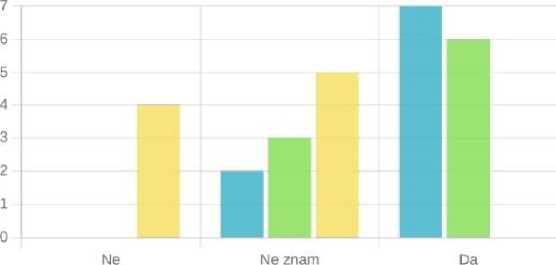
Ne „ Standard „ Weightei
Da Responses znam Deviation Average
|
Sarnovas poslovni |
0 |
2 |
7 |
|||
|
subjekat, ili grupa kojoj pripadate |
(0%) |
(22%) |
(78%) |
2.94 |
9 |
2.78/3 |
|
Vas poslovni subjekat u saradnji sa |
0 |
3 |
6 |
2.45 |
9 |
2.67/3 |
|
drugim subjektima ili institucijama |
(0%) |
(33%) |
(67%) |
|||
|
Vas poslovni subjekat, izmenom i prilagodavanjem |
4 |
5 |
0 |
|||
|
proizvoda/usluge koju je razvio drug! poslovni subjekat ili institucija |
(44%) |
(56%) |
(0%) |
2.16 |
9 |
1.56/3 |
2.33/3
Similar results were achieved regarding the innovation category. Respondents did not recognize innovations that occurred in the market, but they recognized them when it comes to their business entity. In Figure 2, innovations in the market are represented in blue, while the green color pertains to the business entity where the respondents are employed.
Figure 2: Market and Business Entity Innovations
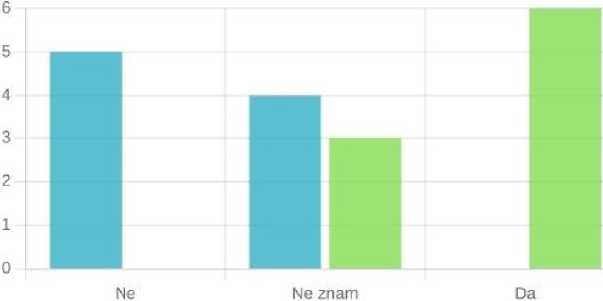
Г Ne ~ Standard „ Weighted
Ne Da Responses znam Deviation Average
Nove na vasem 5 40
9 16 Q 1 44 3
trzistu (56%) (44%) (0%) ■"
Sarno za vase 0 3 6_
2 45 g 2 67 / 3
preduzece (0%) (33%) (67%)'
2.06/3
However, this trend of recognizing innovations achieved by the business entity can be halted by further analysis of the results. In this context, the questionnaire investigated methods of product production, procurement, delivery methods, and support activities for business processes. All three categories have recognitions, although an alarming number of employees marked the "I DON'T KNOW" field as their answer to whether the company had innovations in a specific category. The procurement category stands out as the least known among respondents, where more than 50% of respondents marked that they do not know if there were innovations. Such a response goes hand in hand with the employee structure, so it is somewhat logical that not every employee knows the procurement procedure in the company. About improved methods of product production, a significant 44% of employees knew nothing, while this percentage was slightly lower (33%) regarding support improvement. However, when it comes to positive and negative responses, it is clear at first glance that there are significantly more positive responses, as seen in Figure 3. Here, the blue color is dedicated to improved or new methods of product production, green to procurement, while the yellow color refers to new or significantly improved support activities for business processes.
Figure 3: Methods of production, procurement, and support for business processes
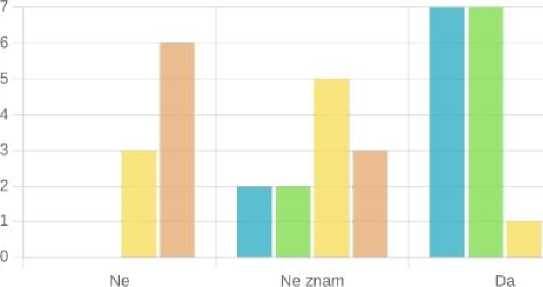
|
Preduzece izmenom i prilagodavnjem procesa koji su razvili drugi |
(56%) (11%) 1 63 9 1 78,3 |
|
Druga preduzecai institucije |
(33%) (o%) 245 9 V33n |
2.17/3
In the end, when it comes to the specific market, only two respondents changed their answer from "I DON'T KNOW" to YES. Namely, in response to the question "Has any of the innovations introduced by the company been previously new on the market," 44% of respondents answered that they were not aware, 33% responded negatively, while 22% gave a positive answer. The results are shown in Figure 4.
Figure 4: Market and Innovations
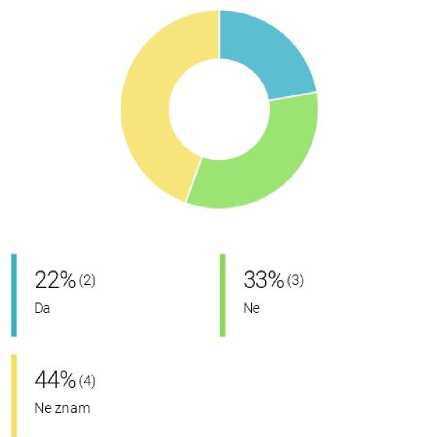
Conclusion
In conclusion, innovations refer to the introduction of novelties in products, services, strategy, or business models. As such, they are relevant to all these components, enhancing their usability and sustainability. The context of innovation can also be seen as an idea, all aimed at keeping the company responsible for innovation ahead of the competition and fostering creativity and efficiency in business. With the goal of becoming a market leader, an organization striving for innovation can achieve not only a better business rating but also improve the position of the entire industry.
This paper examined the company "KOŠ" as a practical example and the significance of innovation as its developmental element. The research results show that by assessing the innovation capacity of the company, it is possible to provide a comprehensive picture of the current situation in the company and possible directions for improvement. In this regard, the evaluation of existing innovation practices and performance is extremely positive. The research results not only demonstrate that the company has introduced various innovations related to processes, products, procurement, and the like but also show that the company has done so either independently or in collaboration with other business entities. Therefore, in combination with the lack of identification of novelties in the market, it can be concluded that the company is a leader in its industry.
Список литературы The significance of innovation as a developmental element of an organization – research results
- Anning-Dorson, Thomas, et al. (2017). Innovation and organizational development: the role of organizational leadership. African Journal of Economic and Management Studies, vol. 1, no. 1, pp. 1-11.
- Arnold, M. (2003). On the Phenomenology of Technology: the “Janus-Faces” of Mobile Phones. Information and Organization, vol. 13, no. 4, pp. 231–256.
- Brynjolfsson, E., Hitt, L. (2015). Beyond Computation: Information Technology, Organizational Transformation, and Business Performance, Journal of Economic Perspectives, vol. 14, no. 4, pp. 23–48.
- Cian, A., jenic, L., Lamosevk, A., Stemberger, J. (2019). How Digitalization Changes the Workplace. Dynamic Relationships Management Journal, vol. 8, no. 1, pp. 3-12.
- Cousins, K., Robey, D. (2015). Managing Work-Life Boundaries with Mobile Technology: An Interpretive Study of Work Practices. Information Technology and People, vol. 28, no. 1, pp. 34–71.
- Creswell, J. W. (2008). Educational Research: Planning, Conducting, and Evaluating Quantitative and Qualitative Research. Upper Saddle River, NJ.
- Čabilovski, Dj., Vukša, S. (2019). Uticaj tehnološkog progresa i inovacija na ekonomski razvoj. Univerzitet u Novom Sadu, Novi Sad.
- Dery, K., Kolb, D., MacCormick, J. (2014). Working with Connective Flow: How Smartphone Use is Evolving in Practice. European Journal of Information Systems, vol. 23, pp. 558–570.
- Gens, F., Levitas, D., Segal, R. (2011). 2011 Consumerization of IT Study: Closing the Consumerization Gap. IDC, Framingham.
- Harris, J. G., Ives, B., Junglas, I. (2012). IT Consumerization: When Gadgets Turn into Enterprise IT Tools. MIS Quarterly Executive, vol. 11, no. 3, pp. 99–112.
- Jonck, P., Van der Walt, F., Sobayeni, N.C. (2017). A Generational Perspective on Work Values in a South African Sample, SA Journal of Industrial Psychology, vol. 43.
- Koffer, S. (2016). The Digitalization of the Knowledge Workplace, Westfalischen WilhelmsUniversitat Munster.
- Kuusisto M. (2015). Effects of Digitalization on Organizations. Tempere University of Technology, Tempere.
- Maier, A., Brad, S., Nicoara, D., Maier, D. (2014). Innovation by developing human resources, ensuring the competitiveness and success of the organization. Procedia-Social and Behavioral Sciences, vol. 109, pp. 645-648.
- Manyika, J. (2015). Digital America: A Tale of the Hives and have-Mores. McKinsey and Company, San Francisco.
- Muro, M., Liu, S., Whiton, J., Kulkarni, S. (2017). Digitalization and the American Workforce. Metropolitan Policy Program, New York.
- OECD, (2005). Oslo Manuel - The Measurement of Scientific and Technological Activities, Paris, third edition.
- Prensky, M. (2001). Digital Natives, Digital Immigrants. On the Horizon, vol. 9, no. 5, pp. 1–6.
- Samuels, M. (2018). Digital Transformation: Closing the Gap between Innovation and Execution. ZDNet, Retrieved from: www.zdnet.com/article/digital-transformationclosing-the-gap-between-innovation-and-execution/.
- Saunders, M., Lewis, P., and Thornhill, A. (2016). Research Methods for Business Students. Cambridge University Press, Retrieved from: https://doi.org/10.1017/CBO9781107415324.004.
- Stentoft, J., Olhager, J., Heikkila, J., and Thoms, L. (2016). Manufacturing Backshoring, a Systematic Literature Review. Springer Science + Business Media, New York.
- Stewart, J., Elizabeth, G., Karen, O., Oishid, S. (2017). Managing Millennials: Embracing Generational Differences. Business Horizons, vol. 60, no. 1, pp. 45-54.
- Strugar, M. (2015). Uticaj dinamike inovacija na kreiranje modela menadžment aktivnosti u organizacionim sistemima. Univerzitet u Novom Sadu, Novi Sad.
- Urbach, N., Roglinger, M. (2019). Introduction to Digitalization Cases: How Organizations Rethink Their Business for the Digital Age. Digital Cases. Springer International Publishing, pp. 1‐12.
- Vodanovich, S., Sundaram, D., Myers, M. D. (2010). Digital Natives and Ubiquitous Information Systems. Information Systems Research, vol. 21, no. 4, pp. 711–723.
- Vuori, V., Helander, N., Okkonen J. (2018). Digitalization in Knowledge Work: the Dream of Enhanced Performance. Technology and Work, Cognition.
- Wang, Q., Myers, M. D., Sundaram, D. (2013). Digital Natives and Digital Immigrants - Towards a Model of Digital Fluency. Business and Information Systems Engineering, vol. 5, no. 6, pp. 409–419.
- Xu, Q., Chen, J., Xie, Z., Liu, J., Zheng, G., Wang, Y. (2007). Total Innovation Management: a novel paradigm of innovation management in the 21st century. The Journal of Technology Transfer, vol. 32, pp. 9-25.

